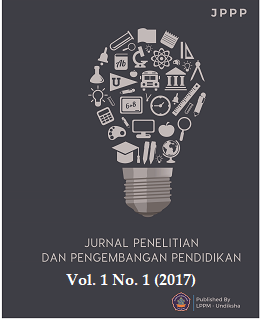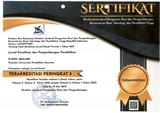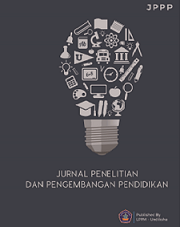PENERAPAN MODEL PEMBELAJARAN EXAMPLE NON EXAMPLES UNTUK MENINGKATKAN HASIL BELAJAR IPS
DOI:
https://doi.org/10.23887/jppp.v1i1.12615Abstract
Penelitian tindakan kelas ini bertujuan untuk meningkatkan hasil belajar IPS siswa melalui penerapan model pembelajaranexamples non examplesdi kelas IV SD Negeri4KaliuntuSemester I TahunPelajaran 2017/2018.Subjek dalam penelitian ini adalah siswa kelas IV SD Negeri 4 Kaliuntu yang berjumlah 33 orang terdiri dari 12 siswa perempuan dan 21 siswa laki-laki. Metode pengumpulan data yang digunakan dalam penelitian ini adalah metode tes. Instrumen pengumpulan data hasil belajar yang digunakan adalah tes objektif pilihan ganda biasa. Data dianalisis dengan menggunakan metode analisis statistik deskriptif dan metode analisis deskriptif kuantitatif. Hasil penelitian ini menunjukkan bahwa terjadi peningkatan hasil belajar sebesar 0,21 dari prasiklus ke siklus I, sebesar 0,39 dari siklus I ke siklus II. Peningkatan hasil belajar IPS siswa dari prasiklus ke siklus II sebesar 0,52. Rata-rata peningkatan nilai hasil IPS siswa dari prasiklus hingga siklus II sebesar 0,3 yang tergolong pada kategori sedang. Sehingga tujuan penelitian ini tercapai bahwa penerapan model Examples Non Examples dapat meningkatkan hasil belajar siswa.Downloads
Published
2017-11-24
How to Cite
Poko, F. (2017). PENERAPAN MODEL PEMBELAJARAN EXAMPLE NON EXAMPLES UNTUK MENINGKATKAN HASIL BELAJAR IPS. Jurnal Penelitian Dan Pengembangan Pendidikan, 1(1). https://doi.org/10.23887/jppp.v1i1.12615
Issue
Section
Articles
License
Authors who publish with the Jurnal Penelitian dan Pengembangan Pendidikan agree to the following terms:
- Authors retain copyright and grant the journal the right of first publication with the work simultaneously licensed under a Creative Commons Attribution License (CC BY-SA 4.0) that allows others to share the work with an acknowledgment of the work's authorship and initial publication in this journal.
- Authors are able to enter into separate, additional contractual arrangements for the non-exclusive distribution of the journal's published version of the work (e.g., post it to an institutional repository or publish it in a book), with an acknowledgment of its initial publication in this journal.
- Authors are permitted and encouraged to post their work online (e.g., in institutional repositories or on their website) prior to and during the submission process, as it can lead to productive exchanges, as well as earlier and greater citation of published work. (See The Effect of Open Access)








